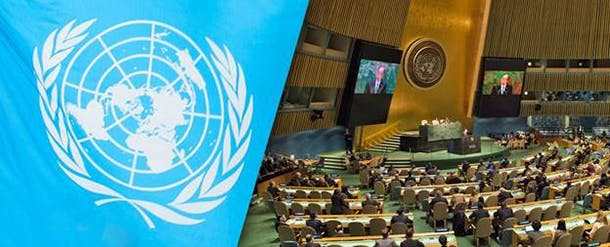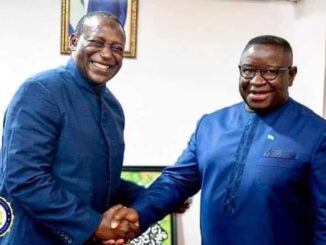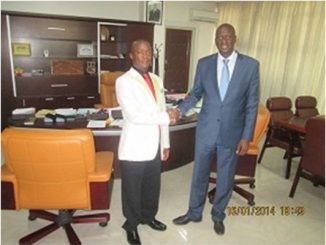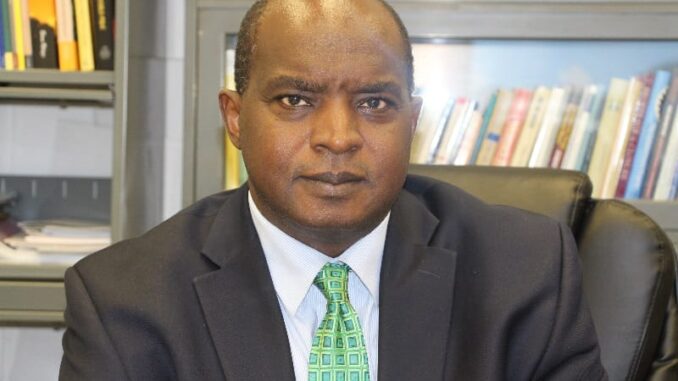
PERMANENT MISSION OF THE REPUBLIC OF
SIERRA LEONE TO THE UNITED NATIONS
STATEMENT BY H.E. DR. ALIE KABBA
PERMANENT REPRESENTATIVE
ON THE QUESTION OF EQUITABLE REPRESENTATION ON AND INCREASE IN THE
MEMBERSHIP OF THE SECURITY COUNCIL AND OTHER MATTERS RELATED TO THE SECURITY COUNCIL ON THE CLUSTERS OF “SIZE
OF AN ENLARGED SECURITY COUNCIL AND WORKING METHODS OF THE COUNCIL” AND
“THE RELATIONSHIP BETWEEN THE COUNCIL AND THE GENERAL ASSEMBLY”
16TH -17TH MARCH 2021
Co-Chairs, Excellencies, Distinguished delegates, Ladies and Gentlemen, I have the honour to deliver this statement on behalf of the African Union Member States. We commend you, Co-Chairs, for convening this third meeting of the IGN in the informal plenary with focus on the clusters of “Size of an enlarged Security Council and the working methods of the Council” and the relationship between the Council and the General Assembly” as expressed in your letter dated 8th February 2021.
We take note of and also thank you for your introductory remarks. While recognizing the tremendous difficulties in guiding and moving this process forward and having regard to the varied and vested interests involved, we remain appreciative of your efforts and commitment to the work on the reform of the Security Council.
At the outset, I would like to reaffirm the full commitment of the African Union Member States to this extremely important issue of the urgent need to reform the Security Council. Africa’s position on this issue is well articulated in the Ezulwini Consensus and Sirte Declaration. We, therefore, look forward to working with all Member States and Interest Groups in making decisive progress towards the reform process.
Co-Chairs, We are not oblivious of the existing divergence on some of the five clusters on the reform of the Security Council. However, we also believe that there already exist areas of convergence in the intergovernmental negotiations, including growing support for expansion of the Security Council. This view is shared by a cross section of the membership.
Expansion in both categories will enable the enlarged Council to be more representative, democratic, transparent, and accountable. Also, there has been considerable support for the inclusion of small and medium size States and of course, an enhanced African representation in an expanded Security Council. In this regard, we reiterate that the size of an enlarged Security Council should be not less than 26 seats. This position is based on the overarching need to correct the current imbalance and injustice in the composition of the Security Council, and it resonates well with the overwhelming call for “an equitable representation on and increase in the membership of the Security Council”.
Accordingly, “Full representation of Africa in the Security Council means not less than two permanent seats with all the prerogatives and privileges of permanent membership, including the right of veto and five non-permanent seats”, with the African Union given the responsibility of selecting its candidates.
The question of the criteria for the selection of African members of the Security Council should be a matter for the AU to determine, taking into consideration the representative nature and capacity of those chosen. We would like to reaffirm that Africa’s demand for at least two permanent seats and two additional non-permanent seats is a matter of common justice and the right to have an equal say in decision making on issues of international peace and security, and in particular, those that concern the African region.
Co-Chairs, With regards to the Working Methods of the Security Council, Africa’s position, which was endorsed by the African Union Assembly, is reflected in our submission in 2009 to the then Chair of the IGN, as well as into the Framework document.
The African position, therefore, proposes especially in an enlarged structure, an accessible, accountable, transparent, democratic, representative and more effective Security Council which gives legitimacy to its decisions and better reflect the current geopolitical realities of the United Nations.
We take note of the considerable efforts to improve the working methods of the Security Council, especially the increase in the number of public meetings and briefings, including consultations between the Presidents of the General Assembly and the Security Council. Africa is however of the view that more needs to be done to improve the Working Methods of the Security Council.
Co-Chairs, As mentioned earlier, the full details of Africa’s position on this cluster are articulated in our inputs/submissions to the then IGN Chair in 2009 and to the Framework document of July 2015, which we can resubmit or make available when the need arises.
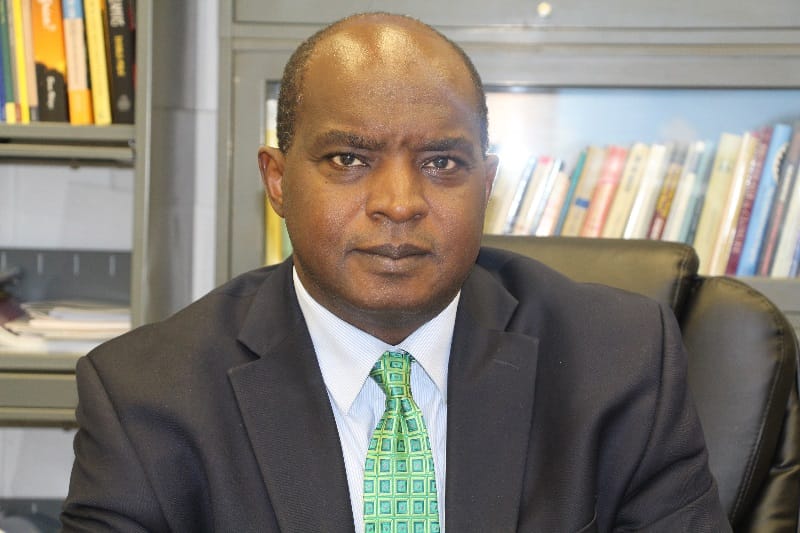
For the purpose of today’s meeting, we would like to underscore the importance of this cluster and how it relates to the Veto, which we believe is critical to decision making in the Security Council, and how the lack ofhaving that prerogative undercuts the effectiveness of the non-permanent members.
The working Methods and Size of an enlarged Security Council are closely linked to the Veto, the relationship between the Council and the General Assembly, as well as Regional Representation. Thus, our call for a comprehensive reform of the Security Council as outlined in Decision 62/557.
The Veto is an integral part of the Working Methods of the Security Council, as it could be used to forestall any decision, even if that decision enjoys the support of more than two thirds of the Council’s membership. Enlarging the Security Council without addressing the fundamental question of the veto will therefore be a mere cosmetic and fruitless endeavour. We would have only addressed the symptoms and not the real malaise. Africa’s continued under-representation in the non-permanent category and its non-representation in the permanent category puts not only one of the geographic regions of the United Nations in a disadvantaged position, but it also deprives over one billion people that are often affected by the decisions of the Council to have a fair say in reaching such decisions. That is why we continue to call for the abolition of the veto or, if that is not conceivable, it should be extended to the African Permanent Members who likewise need it to have an effective voice in the decision-making process of the Security Council, in which 73% of issues are matters relating to Africa.
We are convinced that an effective African voice in the Permanent Category of the Security Council, with all the rights and privileges, will contribute to the Council’s ability to take preventive measures as opposed to being reactive, more especially on issues related to the African continent. It is in this regard that we continue to call for a comprehensive reform that will address our genuine concerns, as well as our demand for equity in the composition of the Council. The need to address the representativeness of the Security Council and the legitimacy of its decisions underpins the shared demands of the African Union Member States.
In view of this, we are ready to work with you and all Member States and interest groups to reform the Security Council to ensure that it represents “We the People”, and not just a select few. Having stated the foregoing, let me highlight our position on the Working Methods of the Council: 1. Active dialogue between the members of the Security Council and the countries that are on its agenda, including those contributing to peace operations and non-governmental organizations is important to enhance the transparency and effectiveness of the Councils work.
2. The Security Council should strengthen its relationship with the UN Secretariat and troop contributing countries (TCCs) and Police Contributing Countries (PCCs), including through a sustained, regular, and timely interaction. Africa believes that meetings with TCCs should be held not only in the drawing up of mandates, but also in their implementation, when considering a change in a renewal and completion of a mission’s mandate, or when there is a rapid deterioration of the situation on the ground. In this context, the Security Council Working Group on Peacekeeping Operations should involve TCCs more frequently and intensively in its deliberations, particularly in the early stages of mission planning and subsequently throughout the whole process of implementation.
3. The Security Council should uphold the principles as well as protect and ensure respect of the Charter concerning its functions and powers, and to this end, desist from the practice of engaging and initiating formal and informal discussions on the situation in any Member State of the UN or on any issue that does not constitute a threat to international peace and security, and which is contrary to the provisions of Article 24 of the Charter.
4. The Security Council should create its subsidiary organs in line with the provisions of the UN Charter, and these organs should function in a manner that would provide adequate and timely information on their activities to the general UN membership.
5. The Security Council should not be exploited to pursue national political interests and must ensure the necessity of non-selectivity and impartiality in its work. It should protect within the powers and functions accorded to it by the Member States under the UN Charter.
6. The Security Council should not resort to Chapter VII (seven) of the Charter as an umbrella for addressing issues that do not necessarily pose a threat to international peace and security; and should use the provisions of relevant Chapters, where appropriate, including Chapters VI (Six) and VIII (Eight), before invoking Chapter VII, which should be a measure of last resort where necessary.
7. There is a need for the General Assembly to examine more closely the Council’s deliberations and decisions, especially when it authorized action under Charter VII of the United Nations Charter, or when one of its permanent members exercises its right of veto.
8. The Security Council should not use sanctions against any State under the pretext or with the aim of achieving the political objectives of one or a few States, rather than the general interest of the international community; and 9. The Security Council, specifically in an enlarged format, should formalize its Rules of Procedures, which have remained provisional for more than 60 years, in order to improve on its transparency and accountability. Co-Chairs, Africa’s position on the cluster on the Relationship between the Security Council and the General Assembly aims at ensuring that the General Assembly remains the chief deliberative, policy making and representative body of the United Nations. This is also in line with the spirit of the 2005 World Summit outcome document which inter-alia identifies, as a priority, the need to ensure that the General Assembly is a truly universal “parliament of nations”.
We, therefore, believe also that the revitalization of the work of the General Assembly can help ensure that this “Chief deliberative, policymaking and representative organ of the United Nations” is more focused, efficient, and relevant. As we have repeatedly stated, the Common African Position contained in the Ezulwini Consensus and Sirte Declaration stresses that reform of the United Nations system should be all-inclusive and must encompass all components of the United Nations system, including the increasing need to improve on the relationship between its two principal organs. Africa, alongside other Member States, has repeatedly expressed concerns about the gradual encroachment by the Security Council on the powers and mandate of the General Assembly. Some of these concerns have found expressions in several resolutions, including Resolutions 51/193, 58/126, 59/313 and subsequent updates adopted by the General Assembly drawing attention to these anomalies and aimed at redressing them.
We reiterate our call for the effective implementation of these resolutions. To this end, Africa will continue to work with other Member States with a view to discouraging any attempts by the Security Council to infringe on matters that clearly fall within the purview of the General Assembly. We are all aware that the General Assembly maintains a shared responsibility in the maintenance of international peace and security and every measure should be taken to strengthen and reaffirm its effectiveness and role in the discharge of its responsibility.
The Security Council’s primary responsibility in the maintenance of international peace and security should not in any way be made an excuse for its assuming exclusive authority in this domain. The need for a coherent interaction and cooperative relationship between the two organs is imperative and must be explored in our drive to reform the organization. Mandates are clearly defined in the Charter and caution is required in their interpretations with a view to restore, preserve and maintain the constitutional balance between them. This will help prevent encroachment upon the functions and powers of the other. Maintaining such a balance will further strengthen the confidence of the membership and enhance the legitimacy of the decisions and actions of the two organs. In keeping with the relevant provisions of the Charter, and in order to ensure the Security Council’s accountability to the General Assembly, Africa is of the view that there is need to strengthen the General Assembly for it to play its role as the most representative, democratic, and deliberative organ within the United Nations system.
The following represents key highlights of Africa’s position on the Relationship Between the Security Council and the General Assembly:
● The Security Council should, in keeping with Article 24(3), submit more comprehensive and analytical reports to the General Assembly. Such reports should contain assessment of the work of the Council, views expressed by its members, as well as the rationale for acting or otherwise on all matters before it;
● The Security Council, in accordance with Articles 15 and 24 of the United Nations Charter, should submit special subject-oriented reports to the General Assembly for its consideration and on issues of current international concern;
● The Security Council should ensure that Member States are fully informed of the nature and scope of its activities not only through full and informative press releases, but also by effectively communicating their views on issues of concern taken by the Council in its informal consultations. Also, the Council should be seen convening more formal and informal consultations involving the interested parties prior to the adoption of resolutions to allow for wider participation.
● The need to provide effective and timely flow and exchange of information between the Security Council and the General Assembly, particularly through frequent and regular consultations between the Presidents of the two organs in order to review work plans and consult on specific issues of mutual concern. Such meetings are expected to augment more direct and dynamic exchanges between both organs; and ensure that the role and authority of the General Assembly on questions relating to international peace and security is respected and to also guarantee the unfettered application of Articles 10 – 14 and 35 of the Charter, and where appropriate Rules 7 – 10 of the Rules of Procedure of the General Assembly.
● The Assembly should consider proposing parameters to prepare monthly assessments of the Security Council, in order to ensure that its reports to the Assembly were comprehensive and analytical, as opposed to being basically a chronology of events. Africa, therefore, reiterates that the two organs must work closely together within their respective spheres in the search for solutions to the plethora of challenges confronting the international community. This would prevent one from encroaching on the other’s mandate, as spelt out in the Charter and would preserve the constitutional balance between them. It is worth noting though, that the relationship between the General assembly and the Security Council has improved significantly over the years including having more meetings between the Presidents of both bodies.
However, more needs to be done to further strengthen the relationship between the two organs. Our comprehensive position on this cluster is also reflected in our position submitted in 2009 as well as the Framework document of July 2015, respectively. In conclusion, Co-Chairs, the five clusters outlined in Decision 62/557 cannot be discussed in isolation of the broad principles outlined in paragraphs 152 – 154 of the World Summit Outcome Document of 2005. These principles include equity, geographical representation, transparency, efficiency, legitimacy, and accountability. The interlinkages of the five clusters cannot also be ignored.
These principles should, in that context, serve as the basis of negotiations on any of the five clusters. This also means that none of the five clusters can be negotiated in isolation of the others. Expansion in both the present permanent and nonpermanent categories is intricately linked to the question of Size and Veto. An expanded Security Council would also require an equitable geographical representation. It, therefore, underpins the requirement of a comprehensive reform of the UN Security Council. In this regard, we reiterate our commitment to Decision 62/557 and call for a comprehensive reform of the Security Council, considering the inter-linkages of the five clusters.
Going forward, we will continue constructive consultations with all Member States and interest groups, including those who have expressed strong support for the Common African Position and the few who are yet to do so. Together, Security Council reform is possible and achievable! Thank you! Merci! Gracias! Shukran! Xixi! Spasiba!
